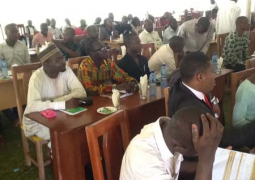
The
Ministry of Finance and Economic Affairs under its directorate of Budget
Thursday hosted a two-day public-private sector forum to sensitise stakeholders
in the public and private sector on the Green Climate Fund (GCF).
The
two-day forum attracted more than two hundred participants, and was held from
21 to 22 March at the Coral Beach Hotel.
The
purpose of the project is to build the capacities of various stakeholders on
climate change, and to raise public awareness on the climate change fund.
The
Green Climate Fund (GCF) was created and designed as an operating entity of the
United Nations Framework Convention on Climate Change (UNFCC), with the aim of
providing technical and financial support as part of the global response to
climate change in developing countries.
The
project will be implemented by the directorate of Budget at the Ministry of
Finance and Economic Affairs.
Delivering
a speech at the forum, the permanent secretary at the Ministry of Environment,
Climate Change and Natural Resources, Lamin Jawara, said climate change
increased the frequency and severity of extreme weather events, and has a
long-term impact on the communities and their livelihood.
This
country has also experienced drought-related crop failures and severe floods
over the past decade, as well as the threat faced by the entire Gambian
coastline, including Banjul from coastal erosion and sea-level rise.
PS
Jawara noted that rural and urban communities whose livelihood and homes suffer
physical danger and health problems, may need to be relocated in some cases.
The
disadvantaged communities, including subsistence farmers; slum and coastal
dwellers are particularly affected, he added.
The
deputy UNDP representative in The Gambia, Nessie Golakai, speaking at the
forum, said the project came at a time when climate change has gained
recognition as a defining moment of time, and its negative effects on the
livelihoods of the poor and vulnerable are being felt around the world.
It
came at a time when nations are pooling their resources to combat and reverse
threats posed by climate change, she added.
“The
Gambia is not left behind in this global crusade.”
Yahya
Drammeh, deputy permanent secretary at the ministry of Finance, said in The
Gambia about 60 per cent of the population is heavily reliant on agriculture.
The
effects of climate change are increasingly apparent, more severe droughts,
reduced food and water security and rising sea levels threatening the coastal
zones, he added.
The
adverse effects of climate change are creating risks for achieving sustainable
socio-economic development, Drammeh continued.
Most
importantly, he went on, the low level of available climate finance to address
these issues has proven to be a challenge.
The
project was tasked to sensitise all key stakeholders in The Gambia about the
procedures and opportunities of the fund, he announced.
“The
country strategic document aimed at outlining our strategic priorities for
interactions with the fund, and will be developed and submitted to the fund,
following comprehensive consultations with all key stakeholders including
private, public and regional and local actors and government.”



